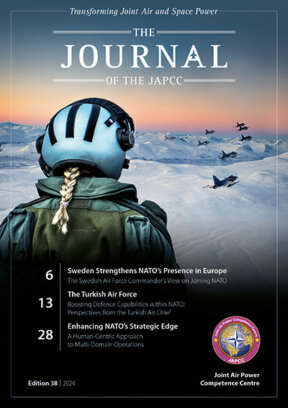Editorial
After an exhilarating three years in Kalkar, my tenure as the JAPCC Assistant Director and Managing Editor of this Journal will end in September 2024. I am immensely grateful to my editorial team, under the leadership of the Chief of Staff, for their dedication and hard work in ensuring the success of our Journal. Their efforts have made my role seamless, and I truly appreciate their contributions. I also extend my thanks to all the contributing Nations for providing their exceptional Subject Matter Experts, who have enriched the relevance of the JAPCC.
Editing the Journal has been one of the most rewarding tasks in my entire portfolio. The numerous contributions from across the Alliance and beyond have been thought-provoking and innovative, but also educational and simply enjoyable to read. I extend my heartfelt gratitude to all of you – readers and authors alike – who have played a role in making this Journal a valuable asset in JAPCC’s transformational toolbox.
We kick off this issue with a captivating article by Major General Jonas Wikman, Commander of the Swedish Air Force, who discusses Sweden’s recent accession into NATO and its implications for the air domain. Following this, General Ziya Cemal Kadıoğlu, Commander of the Turkish Air Force, shares his perspectives on current efforts and strategic advancements within his service.
Next, we explore the cybersecurity risks brought about by the proliferation of small satellites, followed by the latest advancements and methodologies for human performance in Multi-Domain Operations. Continuing our theme of transformational capabilities, we conclude our three-part series on the military applications of quantum technology. Next, we examine the concept of hosted payloads in space, proposing this as an additional layer of resilience and deterrence.
Within our Viewpoints section, we delve into defence acquisition principles in the new security and technology environment with an intriguing article on ‘Bending the Hufnagel’. This is followed by an exploration of the evolving technological and policy challenges for deterrence. Then we discuss Multi-Domain Operations in NATO, focusing on aspects of trust and technology in the US’s Combined Joint All Domain Command and Control concept. Finally, we present fresh perspectives on measures of effectiveness in non-lethal targeting.
Thank you for your valuable feedback, which has greatly contributed to our ongoing efforts to transform Joint Air and Space Power. We invite you to explore our website at www.japcc.org, connect with us on LinkedIn, or reach out to us via email at .
Finally, let me introduce the new JAPCC Assistant Director, Colonel Vito Cracas of the Italian Air Force and wish him the best in this great and challenging job. I know he’ll continue the JAPCC’s proud tradition of delivering independent thought and analysis to promote and improve NATO Air Power!
Paul Herber
Air Commodore, NE AF
Assistant Director, JAPCC








